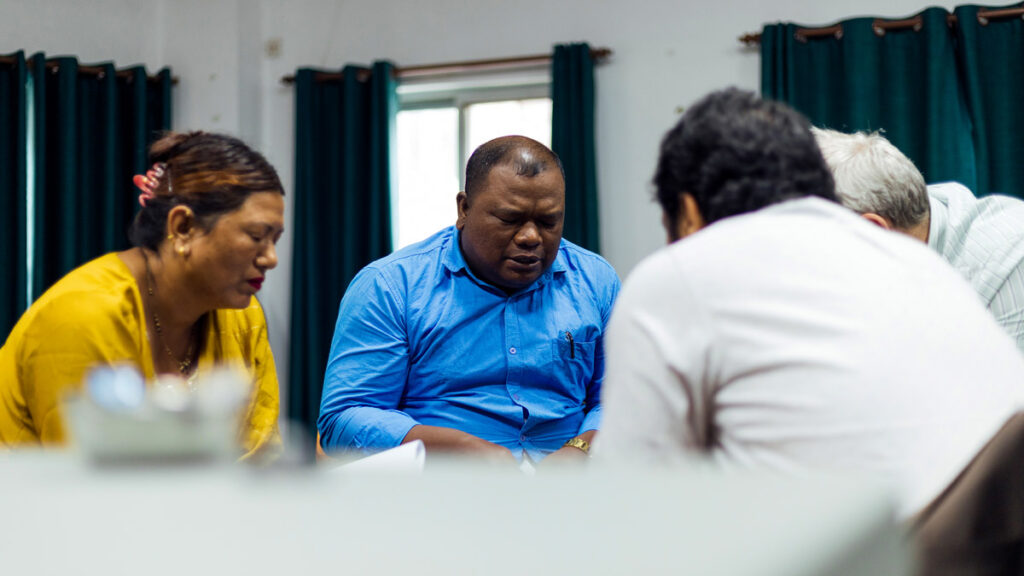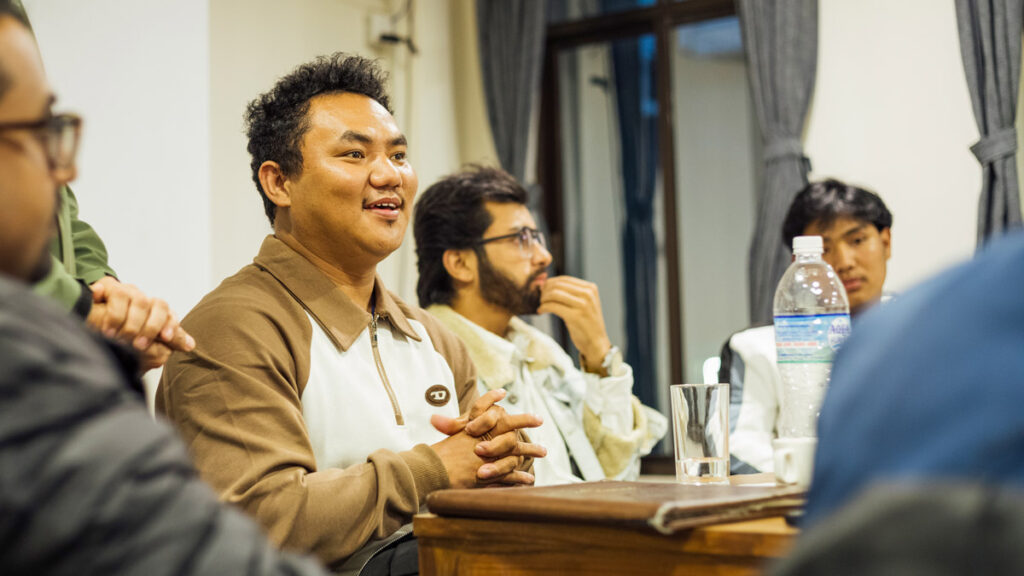Oman’s story
Rejected and shamed but still following Jesus
#JesusNeverGivesUp
Photo: Oman smiles as he tells his story, even when he talks about being shamed for his faith
When Oman* in Nepal started following Jesus, his parents threw him out of the family home. He has been ridiculed, shamed and threatened because of his faith. But rather than giving up, after training at a CMS partner college, he is making disciples and planting churches.
I’m from southern Nepal and grew up following another religion. My father and grandfathers all belonged to this religion. When my father and grandfather got sick, they prayed to their god, but he didn’t answer, and they lived in pain and suffering. As a teenager I asked them: If the god you worship can’t help us, is he really the true God?
When I was about 18, I met a church pastor, who shared the gospel with me and took me to his church. After going to church for a year, I saw someone delivered from an evil spirit and gave my life to Jesus.
Rejected but not forsaken
At home, I stopped observing our family’s religious rules. Tension built up gradually until one night, my family threw me out of the house. That night, I slept in a field and cried for several hours. I was heartbroken: it felt like the most terrible thing in the world that my parents would reject me. The next day, God spoke to me: “Your worldly parents may reject you but I will not forsake you.” Later, I reconciled with my family – they decided to let me live as a Christian and welcomed me home.

When I told people around me that I was following Jesus, they ridiculed me and called me a lunatic. But I knew that Jesus is the true God and those people would someday look for him. They were also struggling with evil spirits and the only one who could really help them was Jesus.
From apprentice to church planter
I left school and started working with my pastor as his apprentice. After a year and a half of making disciples alongside him, I realised I needed to grow and he suggested I get some training. He had in mind a three-month residential course at a longtime CMS partner training college to help me deepen my faith and become more effective in ministry. Incredibly, my family agreed I could go. [This course has been led by CMS partners. It helps people like Oman, first generation Christians in remote areas, to access training in leading churches without needing to leave home for several years.]
“The Bible says that if you want to be a disciple, there’s a cost involved.”
The training was intensive and practical. During those three months, I learned how to do ministry, preach the gospel, do things that I’m still doing now.
We had teaching on spiritual warfare, learning about our authority in Jesus. Nearly all the believers I look after now have been delivered from evil spirits, but before I had the training, I didn’t know about the weapons of spiritual warfare or how to fight.
The training also covered bitterness, hurt and unforgiveness. Around 90 per cent of the people I meet have a root of bitterness in their heart, and being able to bring this type of issue into the light and help people deal with it is very important.

One pastor also taught us about the Bible and preaching. I learned how to preach more powerfully than before through better preparation, grounding my teaching in God’s Word and structuring my sermons differently. Although I found it hard at the time, this is one of the most useful aspects of the training, as preaching is such a core part of my ministry.
When I came back from training, I started using my God-given authority over evil spirits, preaching in a different way and discipling people more effectively. After the course, I was able to start planting churches and doing ministry myself, not just with my pastor. My training gave me the tools I needed to plant three house churches in my area. One of these now meets in a church building on my family’s property – and a CMS partner came to support us as we inaugurated the church. Altogether, I look after 150 believers.
Refusing to give up
In Nepal, persecution is getting worse. For example, one day when I came out of a house church meeting, a crowd of about 300 people was blocking my way. They came with the intent of beating me, smearing me with ink – that is one of the worst punishments a person can get. They wanted to put me in jail. For 25 minutes they argued and questioned me about what I was doing there and why. They pushed me, they shoved me, they tore my clothes and threw my shoes away and they were preparing ink to smear on my face. At that moment, I felt completely alone, but God protected me. It felt like the story of Daniel in the lions’ den. I know that in the midst of persecution and suffering, God is with me.
Ink-shaming
In Nepal, throwing or smearing black ink on a person is a huge sign of disrespect. It’s an act meant to publicly humiliate someone – to mark them as an outsider and declare, “You don’t belong here!” Black is used because of its association with evil.
Even so, I knew that if I went back to that village, people would probably try to break my bones. The danger is real. Recently I was invited to go to Kathmandu for a couple of months for a break, but I didn’t want my believers to think I was afraid or that I had forsaken them.
The Bible says that if you want to be a disciple, there’s a cost involved. Sometimes there might be doubt, but I recognise that God is there in the midst of these things. Jesus is alive. He will never give up. I also will not give up.
*Name changed for security reasons